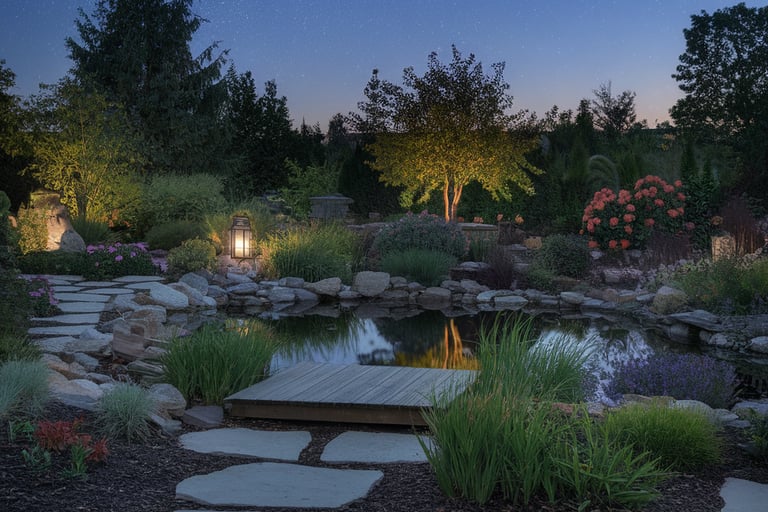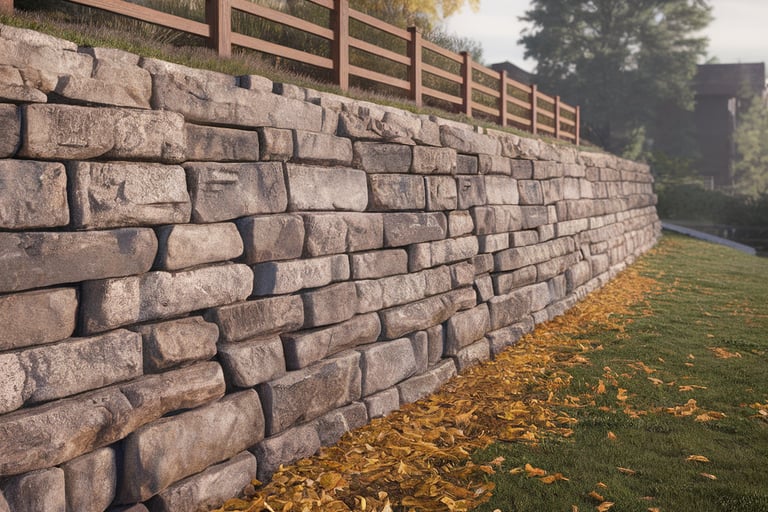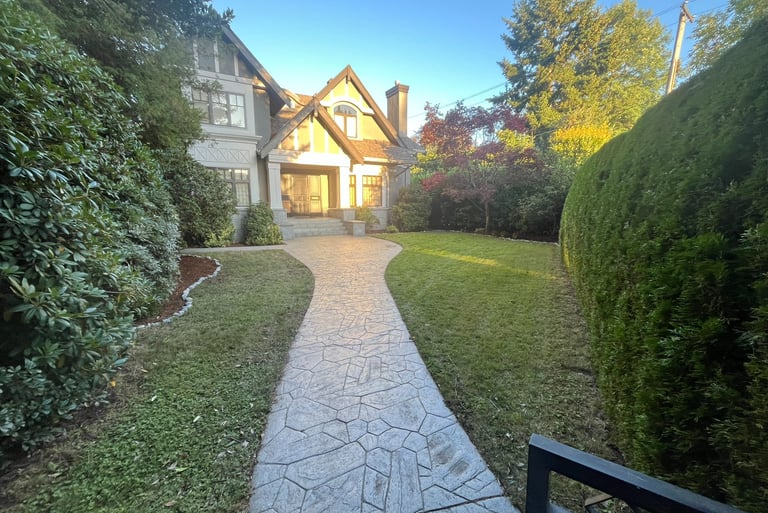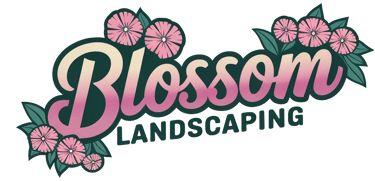
Sustainable Landscaping Practices in Vancouver: A Comprehensive Guide (2024)
11/29/20246 min read
Sustainable Landscaping Practices in Vancouver
Vancouver's unique coastal climate and environmental consciousness make it the perfect setting for sustainable landscaping practices. As our city continues to lead the way in green initiatives, more homeowners are seeking ways to create environmentally responsible outdoor spaces that thrive in our specific climate conditions. This comprehensive guide will explore how to implement sustainable landscaping practices that are perfectly suited to Vancouver's maritime environment.
Understanding Vancouver's Climate and Ecosystem
Vancouver's mild, rainy winters and relatively dry summers create distinct challenges and opportunities for sustainable landscaping. With an average of 169 rainy days per year according to Environment Canada, our gardens need to be designed to handle both abundant moisture and seasonal drought. This unique climate pattern requires thoughtful planning and specific approaches to create truly sustainable landscapes.
Native Plant Selection for Vancouver Gardens
One of the cornerstones of sustainable landscaping in Vancouver is the use of native plants. Species that have evolved in our local ecosystem are naturally adapted to our rainfall patterns and soil conditions. The UBC Botanical Garden showcases excellent examples of native plants that thrive in our climate.
Some particularly successful native plants for Vancouver gardens include:
Western Sword Fern (Polystichum munitum) thrives in our shaded areas and requires minimal maintenance once established. These ferns are particularly well-suited to North Vancouver's forested areas and can handle the heavy rainfall we experience from October to March.
Salal (Gaultheria shallon) provides excellent ground cover and erosion control, particularly important for Vancouver's hillside properties. It's also drought-resistant once established, making it perfect for our increasingly dry summers.
Water Management and Rain Gardens
Vancouver's rainfall patterns make water management crucial for sustainable landscaping. The City of emphasizes the importance of managing rainwater where it falls. This approach not only helps prevent stormwater runoff but also reduces the burden on our municipal infrastructure.
Implementing proper drainage systems and rain gardens has become increasingly important, especially in areas like False Creek and Mount Pleasant, where historical stream patterns can cause water accumulation. Working with local landscape professionals who understand Vancouver's specific drainage requirements is crucial for successful implementation.
Soil Health and Management
Vancouver's naturally acidic soil, influenced by our high rainfall and coniferous forest history, requires specific attention. Regular soil testing through local services like Pacific Soil Analysis can help determine the exact needs of your garden. Many Vancouver gardens benefit from annual lime applications to maintain optimal pH levels for plant growth.
The use of organic mulch, particularly from local sources like Fraser Valley Bark Mulch, helps retain moisture during our dry summers while improving soil structure. This practice is particularly important for gardens in exposed areas like Point Grey or Kitsilano, where wind can quickly dry out soil.
Sustainable Hardscaping Materials and Practices
When it comes to hardscaping in Vancouver's wet climate, material selection is crucial for longevity and environmental impact. Local suppliers like Northwest Landscape Supply offer permeable pavers that allow rainwater to penetrate the ground naturally, reducing runoff and supporting our local aquifers. These materials are particularly important in neighborhoods like Dunbar and Kerrisdale, where older drainage systems can become overwhelmed during heavy rainfall.
Recycled concrete aggregate, available from Vancouver's Ocean Construction Supplies, provides an excellent sustainable alternative to traditional materials. This option not only reduces landfill waste but also decreases the demand for new resource extraction. For retaining walls and garden borders, locally sourced natural stone from quarries in the Lower Mainland offers both durability and a reduced carbon footprint compared to imported materials.
Energy-Efficient Landscape Lighting
Vancouver's long winter nights make landscape lighting essential, but sustainability demands energy-efficient solutions. LED lighting systems, available through local suppliers like Western Lighting Systems, use up to 80% less energy than traditional systems. Solar-powered options are increasingly viable, even with our cloudy winter weather, particularly when strategically placed in south-facing locations.
Smart irrigation controllers, which adjust watering schedules based on local weather data, have become invaluable for Vancouver gardens. These systems can reduce water consumption by up to 30% compared to traditional timers, particularly important during our summer water restrictions.
Wildlife-Friendly Garden Design
Creating sustainable landscapes in Vancouver means supporting our local wildlife. The Stanley Park Ecology Society provides excellent resources for designing gardens that support native pollinators and birds. Including features like bird baths and pollinator-friendly plants helps maintain our local biodiversity.
Incorporating berry-producing native shrubs like Salmonberry and Oregon Grape provides food sources for local birds while creating year-round interest in your garden. These plants are particularly successful in areas like the British Properties and Forest Hills, where wildlife corridors are essential.
Maintenance Practices for Sustainable Landscapes
Sustainable maintenance practices in Vancouver require specific attention to our seasonal patterns. Fall cleanup should focus on leaving some leaf litter for beneficial insects while preventing excessive moisture buildup that can lead to fungal issues in our wet climate. The City of Vancouver's Green Waste Program provides excellent guidelines for proper disposal of garden waste.
Proper pruning timing is crucial in our climate. Most major pruning should be done during our drier months (July to September) to reduce the risk of fungal infections. Working with certified arborists who understand Vancouver's specific challenges, like Davey Tree Expert Company, ensures proper care for larger specimens.
Sustainable Pest Management
Vancouver's mild climate can support various pest populations, but sustainable management focuses on prevention and biological controls. The UBC Botanical Garden offers workshops on integrated pest management specifically tailored to our region. Natural predators like beneficial nematodes, which are particularly effective against chafer beetles (a common Vancouver lawn pest), can be purchased from local garden centers like GardenWorks.
Sustainable Lawn Alternatives
Traditional lawns are increasingly being replaced with more sustainable options in Vancouver. The Vancouver Park Board has been leading by example, implementing micro-clover and eco-lawn mixtures in public spaces. These alternatives require less water, minimal mowing, and thrive in our specific climate conditions.
Micro-clover lawns have proven particularly successful in Vancouver's West Side neighborhoods, where they can handle both shade and sun exposure. These lawns stay green year-round and naturally fix nitrogen in the soil, reducing the need for fertilizers. Local suppliers like West Coast Seeds offer micro-clover seed mixes specifically formulated for our coastal climate.
Community Resources and Education
Vancouver offers numerous resources for homeowners interested in sustainable landscaping. The VanDusen Botanical Garden regularly hosts workshops on sustainable gardening practices specific to our region. Their demonstration gardens showcase successful plant combinations for different micro-climates throughout the city.
The Environmental Youth Alliance offers community programs teaching sustainable gardening practices, while the Vancouver Master Gardeners provide free advice at local farmers' markets and garden centers throughout the growing season.
Neighborhood-Specific Considerations
Kitsilano and Point Grey
These exposed coastal areas require wind-resistant plantings and salt-tolerant species. Installing windbreaks using native conifers like Western Red Cedar can protect more delicate plants while providing year-round screening.
East Vancouver
Areas like Strathcona and Hastings-Sunrise benefit from urban agriculture integration. Community gardens and food-producing landscapes can be seamlessly incorporated into sustainable design plans.
North Vancouver
Properties here often deal with steep slopes and heavy shade. Implementing erosion control through native ground covers and proper drainage systems is crucial for sustainability.
South Vancouver
Areas near the Fraser River may experience high water tables. Rain gardens and proper plant selection for wet conditions are essential components of sustainable landscapes here.
Seasonal Maintenance Calendar
Winter (November-February)
Monitor drainage systems during heavy rains
Protect sensitive plants with locally sourced mulch
Prune deciduous trees during dormancy
Spring (March-May)
Apply organic fertilizers as soil temperatures warm
Install new native plants before summer heat
Begin water conservation practices
Summer (June-August)
Follow Vancouver's water restrictions
Mulch to retain moisture
Monitor for pest issues using organic controls
Fall (September-October)
Prepare gardens for winter rains
Plant trees and shrubs for optimal establishment
Collect leaves for composting
FAQ Section
Q: How much does converting to a sustainable landscape cost in Vancouver?
A: Initial costs typically range from $5,000-$15,000 for an average-sized property, but long-term savings in water bills and maintenance often offset this investment within 3-5 years.
Q: Do sustainable landscapes require special permits in Vancouver?
A: Some elements like rain gardens or significant tree work may require permits. Check with the City of Vancouver's Development Services for current requirements.
Q: How can I find certified sustainable landscape professionals in Vancouver?
A: Look for professionals certified by the BC Landscape and Nursery Association or Canadian Nursery Landscape Association.
Q: What native plants work best for shady Vancouver gardens?
A: Plants like False Solomon's Seal, Inside-out Flower, and Western Wood Fern thrive in Vancouver's shady conditions while supporting local ecosystems.
Creating a sustainable landscape in Vancouver requires understanding our unique climate, soil conditions, and local ecosystems. By implementing these Vancouver-specific practices, you'll create a beautiful, environmentally responsible outdoor space that contributes to our city's sustainability goals while reducing maintenance costs and water usage.
Ready to start your sustainable landscaping journey? Contact local landscape professionals who specialize in sustainable practices and understand Vancouver's unique environmental conditions. They can help you create a custom plan that works for your specific property and neighborhood.
[Contact our sustainable landscaping experts today to begin your garden transformation]. To learn more click here.






Where And What Services We Do
Services
Service Locations
UBC - Cambie - Dunbar - West Vancouver - North Vancouver - West Point Grey - Shaughnessey - Richmond - Kerrisdale - South Vancouver - East Vancouver - Kitsilano - Burnaby - Mount Pleasant
Use these link to navigate if you are looking for a specific service. Or wondering about specifics for you exact location.
Contact
Blossomscaping@gmail.com
+1-604-339-9217
© 2024. All rights reserved.
Where we service
3158 W 34th Ave, Vancouver, BC V6N 2S2
UBC - Cambie - Dunbar - West Vancouver - North Vancouver - West Point Grey - Shaughnessey - Richmond - Kerrisdale - South Vancouver - East Vancouver - Kitsilano - Burnaby - Mount Pleasant - Oakridge - Arbutus Ridge - Marpole - Southlands - Victoria-Fraserview


Proudly Servicing Vancouver, British Columbia
What we service
